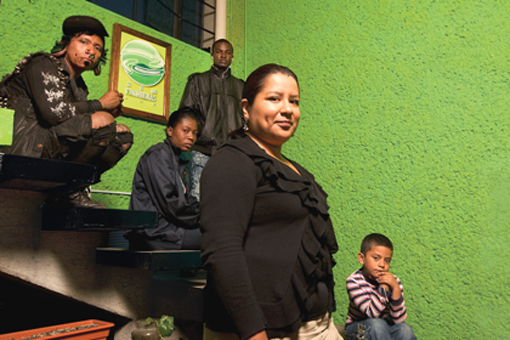This article is part of the Leaders of Social & Political Change series from the Fall 2012 issue of Americas Quarterly. View the full special section.
After the Central American peace accords of the 1980s and 1990s ended decades of civil war, thousands of refugees returned to their home countries. The rise in migration flows triggered stricter government policies controlling the flow of returnees, further endangering the rights of migrant workers and their families. Assistance to protect victims was not enough. Civil society organizations had to step up to define and push for better and more just migration policies and regulations.
In the past 15 years, I have witnessed an epochal change in technology in my home country of Mexico, but laws and policies simply haven’t kept pace with current needs and conditions. Mexico’s history has been marked by a party-dominated system that has impeded institutional development and bred impunity, corruption and a climate that has allowed violence, crime and delinquency to fester and grow.
I was born in 1979 and grew up in Mexico City. My family—and who I am—is a mosaic of my country’s social reality. My father’s family, from the mountainous zone of Guerrero, taught me about isolation and the marginalization of certain communities, about natural resources and the fertility of the land, but also about its unfortunate state of abandonment. From Xochimilco, on my mother’s side, I witnessed deep-rooted poverty and marginalization, as well as demonstrations of cultural diversity, pride and defense of tradition. This is where I learned love for the land, respect and the wonders of life in a community.
In this context, it was impossible to be indifferent to the inequality, lack of opportunity and contrasts I saw in my country. My family history and my experience working for the Redland Christian Migrant Association, a migrant rights organization in Florida, sparked my passion in 1999 for the rights of migrants. I returned to Mexico in 2000 and joined Sin Fronteras (Without Borders) in 2008 to become an advocate for migration policy reform.
In Mexico, civil society has worked consistently and collaboratively to push for the reform that the country requires—politically and morally—to become a more just environment for the rights of migrants and the powerless. This would not be possible without the intellectual and financial contributions of institutions like the Ford Foundation. The Ford Foundation has helped groups like Sin Fronteras forge alliances, promote dialogue and participation in the public sphere, conceptualize themes, and help get them on the public agenda. Its contributions have allowed organizations to adapt, professionalize, consolidate, and create ties to the region, as well as mature their political concepts and develop technical abilities.
From 1999 to 2011, the Ford Foundation granted $2,134,000 to our organization to provide legalaid, education and protection to migrants and refugees, as well as to strengthen collaboration and build capacity among nongovernmental organizations that deal with migration in Mexico and Central America.
The collective actions of these organizations have reduced inequality for the most excluded and marginalized people in Mexico or in any society—migrants. And by doing so, we have helped advance the rule of law in Mexico and Central America.





